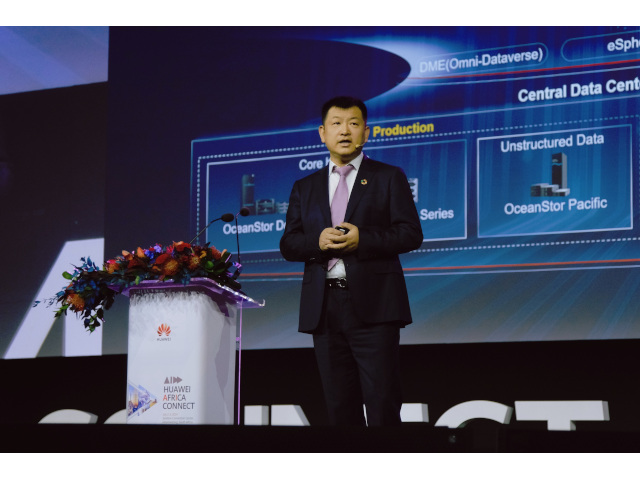Dr. Peter Zhou: Redefining Data Storage in the Data Awakening Era
By Staff Writer 8 July 2024 | Categories: sponsored content
During HUAWEI AFRICA CONNECT 2024 at the Sandton Convention Centre, Dr. Peter Zhou, Vice President of Huawei and President of Huawei Data Storage Product Line, presented the company’s latest vision in a session titled, "Redefining Data Storage in the Data Awakening Era."
AI will disrupt traditional data storage, by improving performance, reliability, and data paradigms. “AI will also have an impact on scalability, sustainability, and data fabric,” Zhou said. In the data awakening era, he added, Huawei will redefine data storage through leading innovation in these six dimensions:
- Ultra performance: Huawei enhances storage performance by a factor of 10, when compared to traditional storage. The storage also supports bandwidth in petabytes per second (PB/s) and 100 million input and output operations per second (IOPS). Greatly improving the efficiency of the entire generative AI process.
- Data resilience: Use of innovative architecture and technologies creates highly reliable systems up to 99.9999%. The built-in ransomware detection engine raises threat detection accuracy to 99.99%. Even the checkpoint recovery time during AI training is shortened to less than a minute.
- New data paradigm: The multi-dimensional tensor data is enabled to support fast data retrieval through an intelligent search engine. The retrieval-augmented generation (RAG) technology works with the embedded knowledge base to eliminate hallucination in large AI models.
- Scalability: A single storage cluster can be scaled out for EB-level capacity and each engine can be scaled up with more GPUs, DPUs, or NPUs for near-storage computing.
- Sustainability: Innovations in storage media and devices have brought about outstanding energy efficiency (less than 1 watt/TB) and storage density (greater than 1 PB/U).
- Data fabric: The capabilities of storage metadata management and search enable global data visibility and management, as well as data mobility that is 10 times more efficient.
These six dimensions guide the philosophy behind the recent launch of the high-performance OceanStor A800, which is a powerful addition to Huawei OceanStor’s A series storage models.
Tailored for AI applications, OceanStor A800 can increase AI cluster utilisation by 30%. When it comes to performance, it delivers high bandwidth and IOPS, which are four and eight times better than its peer vendors. Regarding scalability, OceanStor A800 supports scaling out to EB-level capacity with up to 512 controllers, as well as scaling up to a maximum of 4,096 computing cards. It also conserves space and energy, by achieving outstanding storage density of 1 PB/U and energy efficiency of 0.7 watt/TB.
It provides a new data paradigm with vector index, tensor data, and RAG. In terms of data resilience, the accuracy of ransomware detection is improved from 99.9% to 99.99%. In addition, the data fabric capability facilitates data asset management.
Storage media innovations are also driving sustainable development. Huawei's newly released high-capacity SSDs provide 10 times more capacity with the same disk size, which further reduces a data center’s energy consumption. With 128 TB capacity per disk, the new SSDs consume 88% less storage space and 92% less energy than the peer vendor's SSDs when storing one PB of data.
To be AI-ready, enterprises must get data-ready. The Omni-Dataverse global file system built in the DME makes enterprise data assets visible, manageable, and mobile across regions, thereby building a solid AI data lake storage foundation for enterprises.
Dr. Peter Zhou ended by emphasising Huawei's commitment to redefining data storage and focusing on customer challenges and demands in the data awakening era, while building leading AI-ready data infrastructure for greater customer value.
Most Read Articles

Have Your Say
What new tech or developments are you most anticipating this year?



